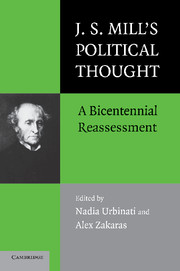Introduction
Published online by Cambridge University Press: 08 January 2010
Summary
The year 2006 marks the two-hundredth anniversary of John Stuart Mill's birth, and although his philosophical reputation has varied greatly in the intervening years, it is now clear that Mill ranks among the most influential of modern political thinkers. His On Liberty alone is one of the handful of books indispensable to the liberal self-understanding. Yet despite his enduring influence, and perhaps also because of it, the breadth and complexity of Mill's political thought is often underappreciated. Although his writings remain a touchstone for debates over liberty and liberalism, many other important dimensions of his political philosophy have until recently been mostly ignored or neglected.
Such was not the case during Mill's lifetime. In the mid- to late nineteenth century, Mill was among the most influential European public critics, and his voice was heard across a wide range of disparate political debates. He wrote and commented not only on British politics but also on French and American politics, on the decline of the Austro-Hungarian Empire, and on civil rights movements and movements for national self-determination throughout the world. He penned important reflections on religion and politics, on international relations and despotism, on military intervention and its limits, on the character of democratic culture, and much more. Nor was Mill strictly a scholar or a political philosopher; he was also an activist and an editorialist well aware of his influence on the public opinion of his day.
- Type
- Chapter
- Information
- J.S. Mill's Political ThoughtA Bicentennial Reassessment, pp. 1 - 8Publisher: Cambridge University PressPrint publication year: 2007

